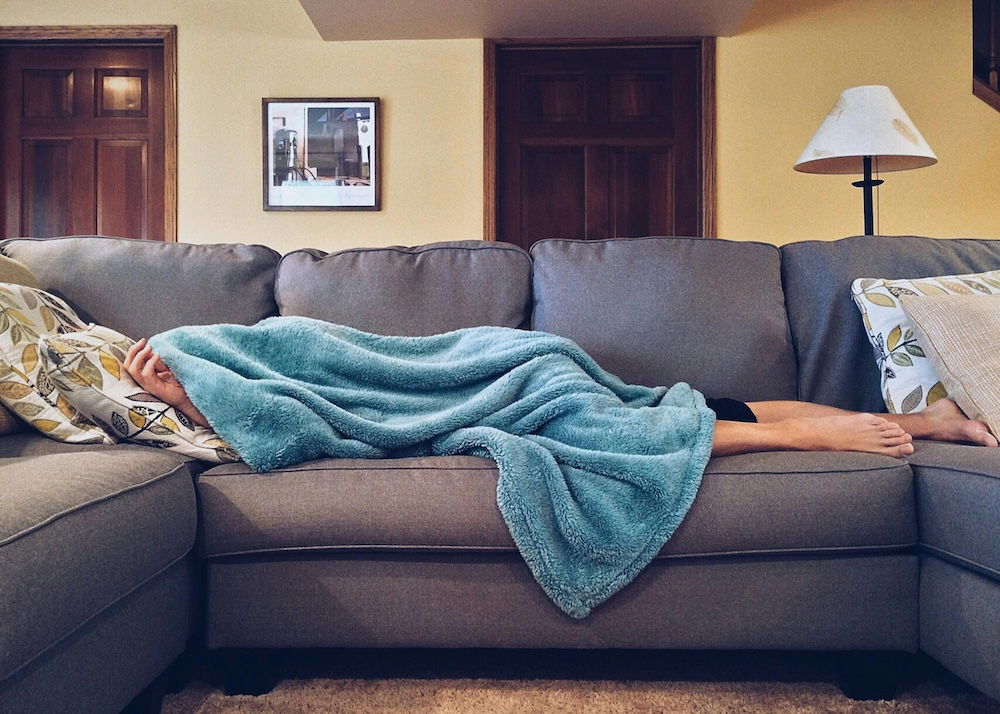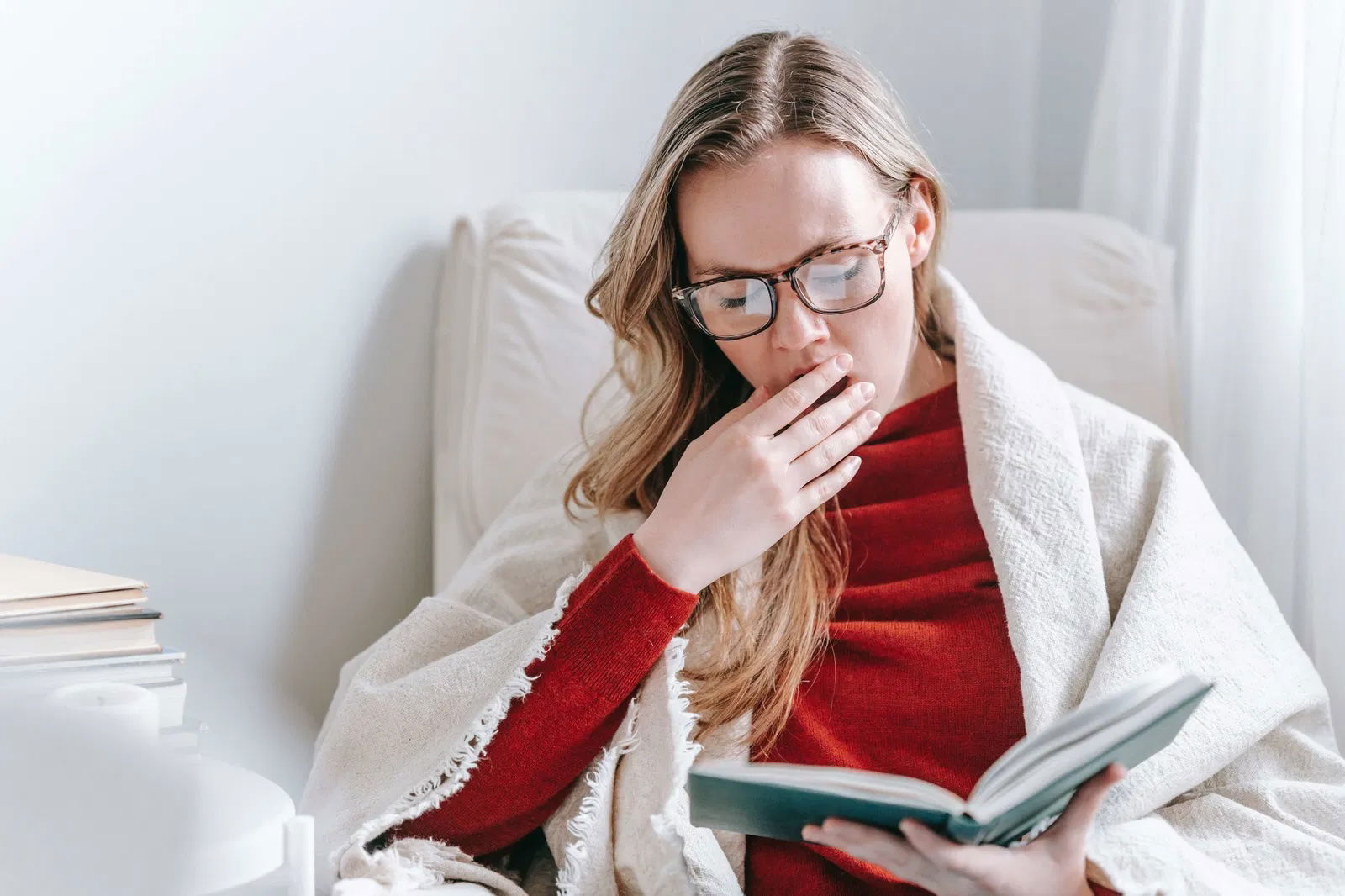A good night's sleep is essential if you want to feel good. And it's not just the hours that count, but certainly the quality of your sleep. Yet many people do not wake up rested. Are you someone who has trouble falling asleep, do you often wake up in the night and think to yourself "Why am I getting poor sleep"? You can read more here about the possible causes of your poor sleep quality and what you can do yourself to sleep better.
Why am I getting poor sleep? + tips to sleep better

Do I sleep poorly?
You may be wondering how much sleep you need as an adult person. And although an adult needs an average of 7-9 hours of sleep per day, how long you sleep doesn't tell the whole story. 'Sleeping well' means falling asleep within 30 minutes, waking up no more than once during the night and feeling energized when you get up in the morning.
Not being able to get through the day without three cups of coffee, getting up and going to bed at irregular times and waking up often during the night can all be signs of poor sleep quality.
What causes poor sleep?
Does 8 hours of deep sleep sound like a dream? Then you may be wondering what causes poor sleep. And more importantly, what you can do yourself to sleep better. Here are 7 possible causes why you sleep poorly, with accompanying tips to sleep better.
1. Sleep apnea
A person with sleep apnea often stops breathing while sleeping. The cause is a sagging throat,which prevents air (or much less) from getting through. Obesity and sleep apnea are closely linked, but it is not necessary to be overweight to suffer from this condition.
Solution: Make an appointment with your doctor to work together to find a solution. It may be that a few lifestyle changes (such as losing weight or sleeping on your side) can make the symptoms go away.
2. Depression or anxiety
Psychological symptoms such as anxiety disorders and depression can cause insomnia. Anxiety makes your thoughts race and repetitive, negative thoughts can keep you from sleeping. Depression can cause you to sleep longer, or just not be able to fall asleep.
Solution: Do you think psychological symptoms are the cause of your sleep problems? Consult a medical specialist to work together to find a solution to these symptoms.
3. Physical pain
Pain in your body may be the cause of your difficulty falling asleep. Conversely, a lack of sleep can cause more pain in your body. Do you experience chronic pain or suffer from tension in your body? Then it is even more important to prioritize a good night's sleep.
Solution: How chronic pain affects sleep varies from person to person. For some, adopting a different sleeping position will already cause improvement while others need long-term care to reduce pain symptoms. Do you think stress is the cause of your pain symptoms? If so, body stress release treatment can provide immediate relief. Always consult a medical specialist if you suffer from chronic pain symptoms.
4. Stress
Stress is one of the biggest causes of sleep problems. No matter how fine our mattress lies and what essential oils we have sprinkled our pillow with: when we are stressed it is almost impossible to fall asleep.
Solution: Take time in the evening to wind down the day and let go of all your worries. If you can't sleep, it can be nice to write down all your thoughts in a notebook. After this it is easier to put them out of your mind. A sleep meditation is also a nice way to end the day. Meditation calms your thoughts so you can fall asleep more easily.
5. Lack of daylight (early in the day)
Exposure to daylight causes your body to produce cortisol. The earlier in the day you are exposed to daylight, the better. This is because in addition to being the stress hormone, cortisol is also the hormone that starts your metabolism, boosts your focus and causes your body to move. Although we need cortisol to function properly, an increase in cortisol (especially later in the day) makes it difficult for you to fall asleep.
Solution: Make sure you get sunlight in your eyes in the first 30 to 60 minutes after you wake up. This causes your cortisol to rise early in the day. At that point, your body receives a signal that it is time to wake up and simultaneously sets a "timer" to fall asleep later in the evening.
Even on a cloudy day, it is important to get outside and expose yourself to daylight. For example, take a short walk every morning as part of your morning routine. You can use a walking meditation for this purpose.
6. Not taking time to wind down the day
If you don't take time to relax after a long day, chances are your head will still be "on" the moment you go to bed. It's important to calm your body and mind first so you can fall asleep peacefully.
Solution: Create a nice evening routine for yourself (a warm bath, a good book, Yoga Nidra, a cup of chamomile tea). Be sure to choose activities that make you feel relaxed. Avoid strenuous exercise or bright light before going to sleep and create a nice environment for yourself with candles, relaxing music and incense (if that's your thing).

7. Caffeine after 4 p.m.
If you are sensitive to caffeine, it is better to leave your latte or cappuccino in the afternoon and evening. This is because caffeine not only makes you feel more alert which makes it harder to fall asleep, it also deteriorates the quality of your sleep.
Solution: Avoid drinking more than 100 milligrams of caffeine later than 4 p.m. Be aware that caffeine is also found in beverages such as green tea, cola and energy drinks. And even in chocolate... If you have sleep problems, it may even be better to avoid caffeine altogether.
8. High body temperature
A drop in body temperature is a sign to our body that it is time to go to sleep. This happens automatically the moment the substance melatonin is released. Therefore, it is important to keep not only your body but also your room cool in the evening.
Solution: Although it may sound contradictory, taking a hot shower or a warm bath will help cool your body, provided you don't stay in or under it for more than 20 to 30 minutes. Furthermore, make sure your bedroom is cool (of around 17 degrees) if you want to fall asleep quickly.
9. Irregular sleep rhythm
Most people tend to sleep out on weekends - especially if they went to bed later the night before. Yet it is wiser to go to bed and get up at the same time every day.
Solution: It is not a bad thing to stay in bed a little longer on weekends than you normally would. However, make sure this is no longer than an hour if you want to sleep better.


Sleeping badly can have several causes. Sleep apnea, depression or anxiety, physical pain and stress are all possible causes why you can't fall asleep.

- Poor concentration
- Mood swings
- Weak immune system
- Increased risk of diabetes
- Low libido
- High blood pressure
- Increase in weight
Written by:


















